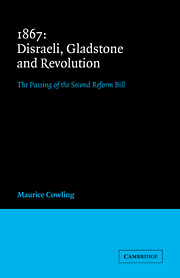Book contents
- Frontmatter
- Contents
- Preface
- Dedication
- Introduction
- I Prelude
- II Preliminary: The uprooting of the Whigs
- III The cornering of the Conservative party
- IV The reassertion of Conservative policy
- V The destruction of Liberal unity
- VI The victory of Disraeli
- VII The public agitation
- VIII The acceptance of Hodgkinson's amendment
- IX Conclusion: Palmerston's mantle
- Epilogue: The limitations of historical knowledge
- Appendixes
- Bibliography
- Notes
- Index
IV - The reassertion of Conservative policy
Published online by Cambridge University Press: 18 December 2009
- Frontmatter
- Contents
- Preface
- Dedication
- Introduction
- I Prelude
- II Preliminary: The uprooting of the Whigs
- III The cornering of the Conservative party
- IV The reassertion of Conservative policy
- V The destruction of Liberal unity
- VI The victory of Disraeli
- VII The public agitation
- VIII The acceptance of Hodgkinson's amendment
- IX Conclusion: Palmerston's mantle
- Epilogue: The limitations of historical knowledge
- Appendixes
- Bibliography
- Notes
- Index
Summary
‘If we cannot retain power, I do not see how a Conservative policy is ever again to prevail in England.’
Lord John Manners, Journal n.d. [but July 1866]With Disraeli committed to a £6 rating franchise, it seemed to Gladstone and the Liberal leaders that they had paid back the Conservative party for the defeat of June 1866. Right up to the introduction of the resolutions, their object had been to make the government introduce a bill. The government had not yet done this, but the bill to which it was committed if the resolutions were passed, was unlikely to be acceptable to the House of Commons. It was, the Liberal leaders knew, not the bill Derby had taken to Windsor on Saturday. It had been accepted by the Cabinet with great reluctance, but the difficulty the Cabinet had had in agreeing would be nothing beside the difficulty Disraeli would have in piloting a bill of this sort through the two Houses. It was not only that Radicals and Gladstonian Liberals would reject the limited enfranchisement involved, but that Whigs and Adullamites would not accept a situation in which, having turned out Gladstone in 1866 for a £7 rental bill, they were expected to accept a £6 rating bill which, as Gladstone pointed out, was very much the same thing. It was necessary to tread cautiously, to avoid pressing the government too hard, to betray no impatience for office and to leave an impression of willingness to give the government every inducement to proceed, while keeping the confidence of advanced opinion in the country at large.
- Type
- Chapter
- Information
- 1867 Disraeli, Gladstone and RevolutionThe Passing of the Second Reform Bill, pp. 152 - 165Publisher: Cambridge University PressPrint publication year: 1967

